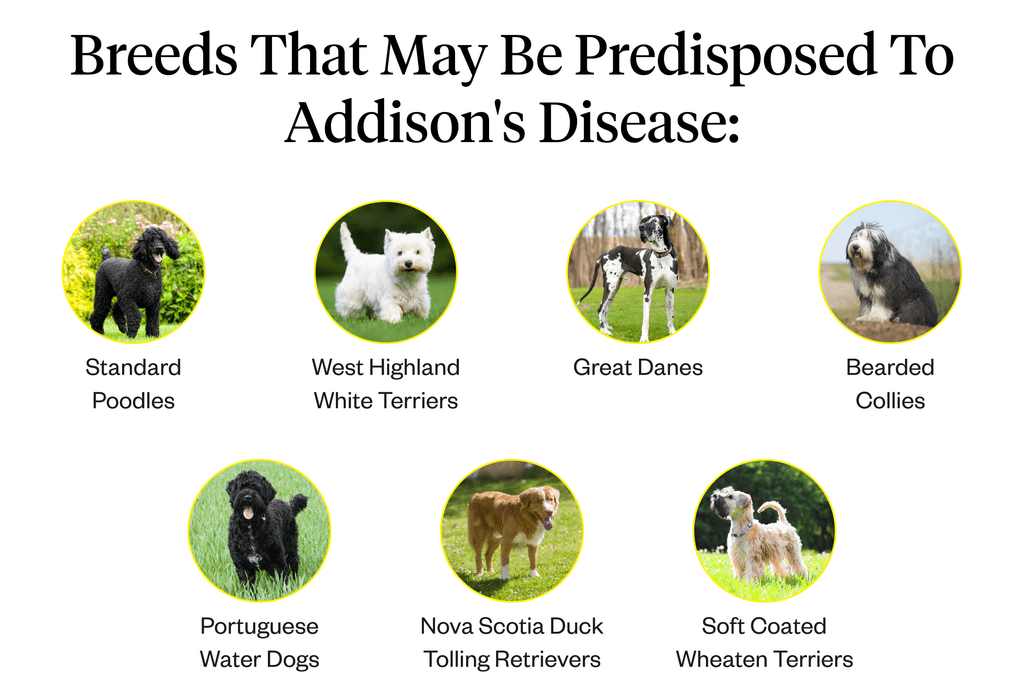
ជំងឺ Addision នៅក្នុងសត្វឆ្កែ: រោគសញ្ញានិងការព្យាបាល
Addison’s syndrome in dogs is also called hypoadrenocorticism. It can be a very frustrating disease for owners and veterinarians alike.
Experts often refer to this disease as the “great mimic” because it can mimic the symptoms of many other diseases and cause a range of vague clinical signs. They appear and disappear, forcing the owners to rack their brains. How is Addison’s syndrome diagnosed in dogs and can it be cured?
Hypoadrenocorticism: Addison’s disease in dogs
In the body of a pet there are many glands that produce and secrete vital hormones. Each gland produces unique “chemical messengers” that are packaged and then carried by the blood throughout the body. One of these glands responsible for the production of hormones in dogs are the adrenal glands.
Adrenal hormones perform many important functions, including regulating blood pressure, controlling the balance of certain electrolytes in the body, maintaining a healthy intestinal tract, and influencing metabolism. In the simplest and most common type of canine hypoadrenocorticism, the adrenal glands do not produce enough of these hormones.
Adrenal function can be impaired for a number of reasons. However, the most common of these is the destruction of adrenal tissue by the body’s own immune system. As a result, this leads to a decrease in hormone production. In very rare cases, this disease can develop due to conditions such as cancer, long-term steroid use, brain tumors, and infections.
According to the Canadian Veterinary Journal, the incidence of Addison’s disease in dogs is very low, ranging from 0,36% to 0,5%.
Addison’s disease in dogs: symptoms
One of the reasons why Addison’s disease can be discouraging for both dog owners and veterinarians is that its clinical signs can vary greatly. At the same time, they can not only manifest themselves in different ways, but also appear and disappear for many years.
It should be remembered that an important sign that can be noticed is the gradual development or recurring episodes of stress-related clinical symptoms. This is because the hormones produced by the adrenal glands play an important role in a dog’s ability to respond appropriately to stressful situations.
Thus, in dogs with Addison’s disease, when these hormones are deficient, there is an abnormal response to stress. This is important to understand for both the detection and treatment of Addison’s disease in a dog. The following clinical symptoms may indicate that a dog has hypoadrenocorticism:
● Weight loss.
● Recurrent vomiting.
● Recurrent diarrhea (may be with or without blood).
● Lethargy.
● Livestock
● Strong thirst.
● Frequent urination.
● Paleness of the gums.
● Tendency to dehydration.
● Poor coat condition.
● Poorly defined musculature.
● Weakness.
● Muscle spasms.
● Collapse – in an extreme form of the disease, known as Addison’s crisis.
Although any dog can get hypoadrenocorticism, it is more common in bitches. According to the Merck Veterinary Manual, the disease can be genetically transmitted in some Nova Scotia Retrievers, Portuguese Water Dogs, Standard Poodles, Great Danes, West Highland White Terriers, Bearded Collies and a number of other breeds.
Addison in dogs: diagnosis
The veterinarian will begin with a history and physical examination. Addison’s disease in dogs is often suspected based on the observation of the owner, as signs and symptoms of the disease come and go and may not be present at the time of the visit to the veterinary clinic.
Since such signs are not specific to the disease, basic blood and urine tests are recommended as the first diagnostic step. The results of the first tests may reinforce or dispel the suspicions of the veterinarian, as well as provide information about the general health of the animal and other possible diseases.
A complete blood count (CBC) along with a biochemical profile and electrolytes will provide additional clues in the case of a strong suspicion of the presence of this disease. However, to formally confirm or rule out the diagnosis, your veterinarian will order a blood test called an ACTH stimulation test, which involves assessing the response of your adrenal glands to a small, harmless injection of the hormone.
Because this test is expensive and can take up to two hours to complete, veterinarians often only order it if Addison’s disease is strongly suspected or if it is important to rule it out as the cause of a pet’s condition.
Addison in dogs: treatment
If a dog has an Addisonian crisis, which is a more serious manifestation of the disease characterized by collapse, shock, and severe dehydration, the pet will likely need to be hospitalized for intravenous fluids and supportive care until recovery.
It is important to take the animal to a veterinarian as soon as possible in case of any suspicion, as this condition can quickly become life-threatening.
Stable patients are usually treated with medication first. It consists predominantly of hormone replacement therapy, which most commonly involves daily oral steroid medications and occasional injections of a drug called deoxycorticosterone pivalate (DOCP). It is a synthetic form of one of the hormones that dogs with Addison’s disease cannot produce on their own.
DOCP injections are usually given monthly, but the frequency of injections may vary from dog to dog. It is important to take your pet regularly to a veterinarian who will take the necessary blood tests to understand what adjustments to the treatment regimen may be needed.
While most dogs with Addison’s disease are given both oral steroids and DOCP injections, some may need only one of these medications. It depends on what hormones their body is still able to produce. Your veterinarian will tell you which medications your pet needs based on the results of the diagnostic tests, taking into account any associated health problems.
Stress management is also extremely important for animals with this disease. The body of a dog suffering from Addison’s disease cannot respond normally to anxiety. Severe stressors can even lead to an Addisonian crisis.
Common stressors can include travel, shelter stays, thunderstorms, fireworks, social gatherings, or other disruptions or changes in routine.
All factors can affect the pet in different ways, depending on its nature. What seems relatively normal to a person can cause serious anxiety in a pet. A classic example is a sudden change in the owner’s work schedule.
Talk to your veterinarian about how to manage stressful situations so that your dog is happy and relaxed at home.
Constant interaction with specialists of the veterinary clinic is of high importance. Most pets with Addison’s disease respond very well to treatment, even though it usually has to be continued for the rest of the dog’s life.
Despite the complex nature of this disease, it is usually treatable if it is diagnosed and managed in time.
សូមមើលផងដែរ:
- តើវាអាចទៅរួចទេក្នុងការផ្តល់ផ្លែឈើ និងផ្លែប៊ឺរីដល់សត្វចិញ្ចឹម?
- Diets for kittens
- How much water do dogs and cats need per day?
- Who is better to have: a cat or a dog?





